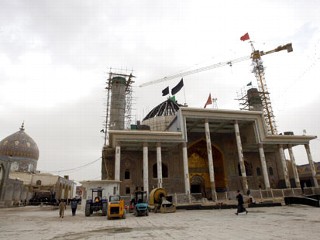Iraq’s reconstruction can offer Lebanon significant opportunities
Lebanon Wire |
By PARAG KHANNA
Iraq remains a violent place, but in recent weeks attention has increasingly shifted toward the long-term process of its reconstruction and political rehabilitation in the wake Saddam Hussein's capture. In both processes, Lebanon can play a crucial role. As the US experiments with democracy in Iraq, it should seek lessons in Lebanon's complex history and current political structure to understand both the difficulty of democratization in the Arab world and the perils of Western-driven "nation-building." Furthermore, as a hub of economic activity in the region, Lebanon's business community and its expertise can make it a key player in both Iraq's and the region's resurgence.
Commentators on Iraq's reconstruction have frequently invoked the post-World War II experience in Germany and Japan for guidance in restoring order and prosperity, but lessons from Lebanese history could be far more useful as America struggles to keep the lid on a looming civil war in a country many times Lebanon's size. During Lebanon's first civil war in the 1860s, French colonialists, equating Christians anywhere with Europeans, forced the Ottoman sultan to form an autonomous province on Mount Lebanon for the Maronites, a move which a century later continued to be favored by many Christians who sought an independent "second Israel." Osama Makdisi, a Lebanese historian and author of The Culture of Sectarianism, writes that traditional Lebanese social hierarchies which bridged religious differences were supplanted by the prevailing religious-nationalist ideology favored by the influx of European Jews. Orientalist influenced and politically convenient sectarian divisions swayed the British to give 80 percent of the Palestinian mandate of land and industries to immigrants instead of locals, which included many Arab Jews. Lebanese intuitively recognize this substitution of religion for family and clan-based social structures, and observe that their own history of "divide and rule" is being replayed in Iraq without regard for the consequences. Sectarian divisions were heightened in the process of selecting the interim Iraqi Governing Council. In late December, dissatisfied with the current arrangement, Iraqi Sunnis formed an autonomous State Council to represent their positions and interests. Despite the good intentions of achieving equal representation while juggling the interests of Shiites, Sunnis and Kurds, US interference in structuring the now de facto Iraqi regime may serve only to solidify potentially disastrous divisions. As in Lebanon, the agents of resistance in Iraq have similar motivations. Furthermore, it has been reported that Hizbullah agents have increased their presence in Iraq, but have thus far been restrained by Iran from conducting attacks on American forces. The hard lessons of Lebanon's political history provide ample guidance for the Coalition Provisional Authority in Iraq. Though Lebanese differ vastly in their opinions on the continuing relevance of sectarian divisions in social life, it is hard to deny that in politics, religion is hard-wired into the system. The favoring of Christians by the 1943 National Pact was a leading cause of Muslim riots in the 1950s, yet the post-civil war arrangement continues to mandate that the president be a Maronite Christian, the prime minister a Sunni, and the head of Parliament a Shiite. Lebanon's "consociational democracy" is a system designed to provide all groups - Christian, Shiite, Sunni and Druze -some representation in an elected government. As such, neither Sunnis nor Shiites can constitute a legislative majority without Christian support. In Lebanon, the current reconstruction effort funds the rebuilding of mosques, churches, offices and housing, making it a nonsectarian venture. Can it help make sure the same is true in Iraq? Lebanon can help Iraqis avoid repeating their fate while building a stronger state. It can serve as a base of operations for foreign firms operating in Iraq over the long-term, providing them with cultural and business expertise. Lebanon has itself developed expertise in the area of construction over the last two decades, and must assert themselves as viable candidates for Iraqi contracts as the bidding process is opened. Between 1998 and 2001, Iraq rose to the third leading market for Lebanese exports. With the military conflict in the region over, Lebanese agricultural exports should find their way back to provide for Iraq's growing demand, and its strong banking and maritime transport sectors can become key links in the new investment chain into Iraq. According to the World Economic Forum's Competitiveness reports, overall investment in Arab region has steadily decreased, yet strong opportunities exist. Given the weak levels of cellular penetration in the region, both Lebanon and Iraq are ripe for greater investment in information technology. In Lebanon, political reform is underway to make the sale of the Cellis and Libancell networks possible, which could raise up to $5 billion. The capital brought in by privatization could spur an expansion of these networks into Iraq, where cellular coverage is a lucrative proposition. Lebanon itself has only 800,000 cellular subscribers, about 20 percent of the population, thus there is plenty of room for growth in the domestic market as well. In other ways as well, Lebanon's strategic location will raise its profile in the region. The United Nations, poised to renew its operations in Iraq, may for some time to come rely on its regional headquarters in Beirut to coordinate that effort. The UN's presence also highlights the need for a regional economic development paradigm, as suggested in the widely cited Arab Human Development Report. The proposed Arab Free Trade Area (AFTA) would greatly benefit Lebanon, from which 30 percent of exports go to other Arab countries (and 40 percent to Europe). Building on the model of ASEAN or MERCOSUR, AFTA would combine Arab League and Gulf Cooperation Council countries into a customs-free zone, spurring countries in the region to overcome their reliance on import duties as a key source of revenue in favor of expanded bilateral exchange. Furthermore, this would bring Lebanon closer to more favorable trade relations with the US, which has already signed free trade agreements with Morocco and Jordan.
